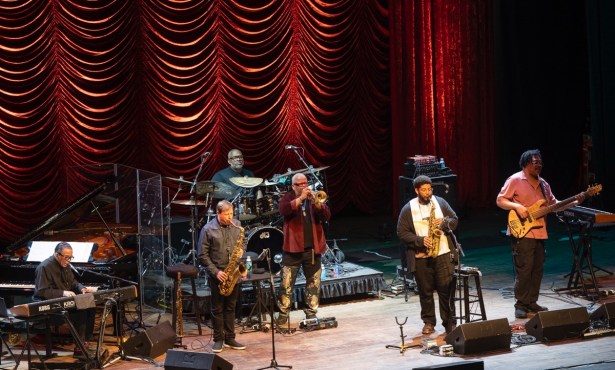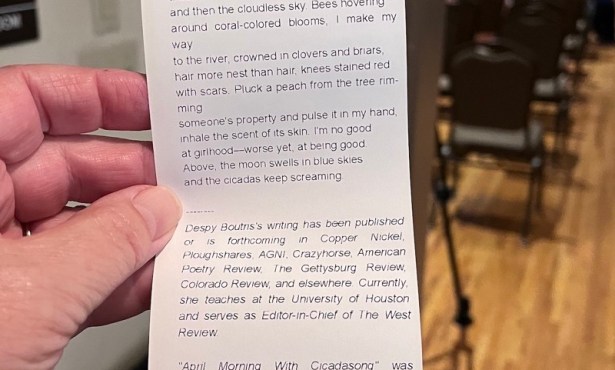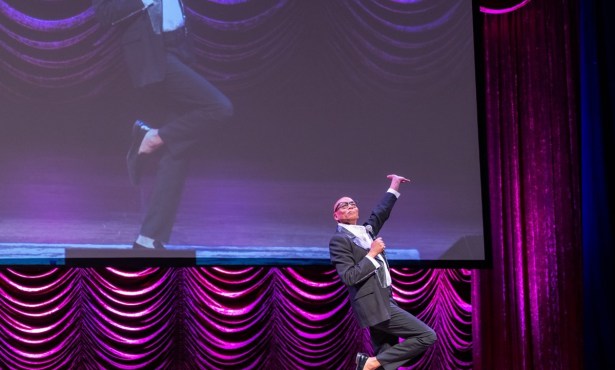Q&A with Dishwalla
Santa Barbara–Based Rockers Talk New Album, Recording at Eric Burdon’s House
After a 12-year gap between albums, Santa Barbara alternative rockers Dishwalla are releasing their first full-length LP since 2005’s self-titled Dishwalla. The band is best known for their 1996 hit single “Counting Blue Cars,” which propelled them to the top of the charts thanks to its unforgettable lyric, “Tell me all your thoughts on God / ‘Cause I’d really like to meet her,” and its song’s infectious post-grunge chorus. (The tune was also included in the film Empire Records, a box office and commercial flop that was dubbed “a soundtrack in search of a movie” by Variety magazine.) Dishwalla took a break in 2005, then reformed three years later with a new leader signer Justin Fox, formerly of Tripdavon, and the band’s original drummer George Pendergast, who had left the group in 1998, and founding members Scot Alexander (bass), Jim Wood (keyboards), and Rodney Browning Cravens (lead guitar).
In between instructing teenage rock musicians in collaboration and music industry expectations at the Rockshop Academy on De la Vina, or co-producing and engineering tracks at studio maestro Sylvia Massy’s RadioStar Studios, let alone the responsibilities of family and everyday life, the members of Dishwalla have had little time to come together and create new music. However, a makeshift Mojave Desert recording session in the secluded home of a rock ’n’ roll legend was enough to re-ignite the Santa Barbarans’ creative chemistry, resulting in their most recent album Juniper Road. I caught up with the band in their Rockshop Academy rehearsal space.
Do you spend most of your time working in Santa Barbara when you’re recording albums?
Fox: A lot of this album was done, in the pre-production phase, in the Cloud. But generally, yeah. We work from here, take our kids to school, and write songs.
Rodney Brown Cravens: It is nice though, when we have the bulk of our work done, to sequester. Get ourselves away from our families, where there’s no distractions. Sort of like how it was at Joshua Tree thanks to Justin and his friend Eric Burdon.
You went to Joshua Tree with Eric Burdon?
Fox: [Laughs.] [This ties into] the story of Juniper Road, which is the name of our new record. We were working in the Cloud, and yes, we were collaborating, but it wasn’t all of us sweating in a room together, which is where the magic happens.
I have a longtime friend, who’s Eric Burdon from The Animals and War, and he has a couple places in Joshua Tree and I was sitting with him one afternoon somewhere, and kind of telling him our thoughts on that. He said, “Why don’t you go to my place out in Joshua Tree. One of my houses is just empty, out in the middle of the desert, and why don’t you go out there and write and figure it out.”
The street that the house is located on is called Juniper Road, so we had such an amazing experience leaving the desert with these songs, and such an amazing transformation of these songs that we had demoed. Some songs had even been sticking around for years, and when we were out in the desert they turned into something completely different we never imagined they could be. So we thought Juniper Road was kind of an appropriate name for the record.
The album cover is actually the entry to the house where we recorded, and that piece of art Eric Burdon made himself. George snapped that picture on his iPhone as we were leaving after two weeks, and we were going through all these photos that we’d taken trying to get ideas, and I came across this photo and I went, “Wow!” We put it on, and everyone saw, and we were like, “That’s an album cover.” So you have this whole inclusive thing that happened at Juniper Road.
Cravens: And for the record it’s never been so easy, A) for a record cover, or B) the title of a record. We all heard that and were like, “That’s good, next.” That’s never happened in the history of this band – it’s usually this knock-down, drag-out fight.
Fox: Y’know, a lot of times album names are very kind of contrived, or formulated, or pondered, and this was just all real. It’s all from the real experiences that have tangible connections to the music this time, it’s not like, “Oh, what sounds or cover would look cool? Let’s put a girl in latex on the cover.” Y’know, it’s, “What is true to the music?”
How was working with Sylvia Massy compared to other producers you’ve worked with in the past?
Alexander: She’s like our sixth band member in a way. I mean, she’s a good referee for us, just to have that extra input to bounce ideas off.
Pendergast: And just great ears. Just a mad genius.
Fox: She has such great ears. I’ve never worked with a producer like her. Like, usually when a band works with a producer, sometimes they’ll intentionally do something to get under your skin to make you perform more, like they’ll do something to make you angry. But she doesn’t do any of that stuff.
Are there any new sounds, instruments, or techniques that you’re putting into your new album?
Wood: Oh yeah [laughs]. There’s always a mix of crazy things that we come up with, for the record, instruments that we haven’t used before. So, for this record Scot’s playing a lap-steel on a couple songs.
Alexander: A setar, too. I got a setar.
Fox: A setar is the Iranian cousin to the Indian sitar, which he played and then piped it through electrically. So we had an electric setar, an electric slide.
Alexander: Tons of different timbres, for sure.
Pendergast: And Jim stole his kid’s toy.
Wood: Yeah, it’s a melodica. It’s like a keyed harmonica, and we got to use it on this one song, “Miles Away,” that’s crazy haunting. It sounds almost like an accordion or harmonica, and it’s neither of those, so it’s kind of weird and sad-sounding.
Alexander: We try to keep it, you know, I hate to use the word timeless, but with the palette of sounds that we implemented on the record, I think there’s nothing too kitschy. There are a lot of vintage sounds, but also organic sounds.
Alexander: In the past we’ve done a lot of movie soundtracks, and a lot of other avenues for our music, other ways to reach people. But, you know, we’re in a world now where the radio, which was key for our success early on…we’re not on a major label, y’know, we put this out on our own. This was a crowdfunded record. It costs a minimum of $5,000 to service a single to radio for one format.
Fox: Might as well do what you love. Not only that, you put the sound on radio, but everything listens to it on Spotify.
Like the commercial machine is this central server that literally distributes out to these 256 affiliate markets.
Alexander: Who put into your head what you’re supposed to listen to.
Fox: We’ve literally walked into radio stations where, y’know, there’s a computer screen and the DJ is at his house or some other remote location, he’s not even at the radio station where you came to do the interview or perform. It’s like, one guy who’s like opening the door, like, “Hey guys, come on in here. Be quiet we’re still doing a segment.” You get in and it’s like robots, and some dude in his underwear in Atlanta, because it’s all run by the big guy in the sky now. And they determine what songs play and what have you.
Cravens: One of my good friends is a radio DJ, and he doesn’t choose anything he plays. He just takes his orders.
Fox: Y’know, the internet is the Wild West, and that’s the beautiful thing about Spotify, and all these things, where you can create your own streaming station and play what you want. To be honest, when we were a circus lineup, college radio was the shit. That’s how bands were breaking.
Alexander: People still want to find out about new music, and the industry can’t kill that. People will find it if it’s there.
411: Dishwalla will open for Tears for Fears Wednesday, July 26, at the Bowl, 1122 N. Milpas St. Call 962-7411 or see sbbowl.com.



